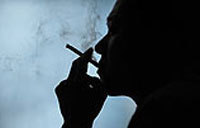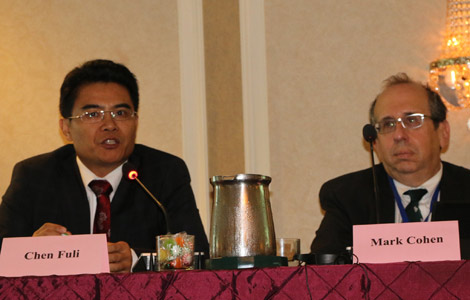Bumpy road for Beijing's anti-smoking drive
Updated: 2014-09-16 17:11
(Xinhua)
|
||||||||
BEIJING - A haze of second hand smoke may continue to hang heavily over Beijing if the latest draft amendment for controls on cigarette smoke remains unchanged.
Wang Qingbin, an associate law professor at the China University of Political Science and Law, said the draft amendment for Beijing's anti-smoking regulations is quite disappointing.
The revision only bans smoking in "shared indoor public places, " compared to a previous draft that banned smoking in all indoor public areas, he said.
Wang made his remarks at a seminar in Beijing on Monday, where an anti-smoking group gathered to discuss ways to get the amendment changed.
"By banning smoking only in 'shared' indoor public areas, the legislators are giving officials with their own offices a chance to smoke, which is against the spirit of equality," Wang said, adding that it will only make law enforcement all the more difficult.
Beijing is headquarters for many central government departments and institutions. Enforcement bodies, which are under the jurisdiction of Beijing Municipality, are unlikely to enter offices of their bosses and stop them smoking.
The previous regulation draft, unveiled in April, significantly expands smoke-free areas. It bans smoking in all indoor public places, workplaces and public transport vehicles. It also bans smokers from open-air areas of kindergartens, schools, children's centers and historical sites.
The draft proposed designating smoking areas in outdoor places of universities, stadiums, fitness centers, medical institutions, tourism sites and parks.
However, the August draft amendment permits smoking rooms in hotels and waiting lounges of airports in the capital city, which will do harm to many lodgers and passengers, said Wu Yiqun, deputy director with ThinkTank Research Center for Health Development, a Beijing-based non-government organization.
 |
| Passengers compensated for others smoking on flight |
"The amendment should be changed to the previous draft to contain smoking in the capital city," Wu said.
With no national law on smoking control established, some cities, such as Shanghai, Harbin and Hangzhou, have local smoking bans. As the national capital, Beijing is expected to set an example, said Yang Gonghuan, deputy head of Chinese Association on Tobacco Control.
China is home to over 300 million smokers, with more than one million people dying as a result of tobacco-related illness a year, according to the World Health Organization (WHO).
The country signed the WHO Framework Convention on Tobacco Control (FCTC) in 2003 and it became effective in 2006. According to the FCTC, China should have banned smoking in indoor public areas completely by 2011. However, it is not unusual to see smokers puff away in restaurants, bars and other public areas.
Most Viewed
Editor's Picks

|

|

|

|

|

|
Today's Top News
Sinopec privatization biggest in Xi's tenure
Beijing to tighten foreign hiring requirements
More CFAs buoy hopes for finance
Hillary Clinton takes a big step toward 2016
US teachers visit China on fellowship
Silk Road, climate change on agenda
Boosting innovation in Latin America
China, LatAm see rosy trade prospect
US Weekly

|

|















